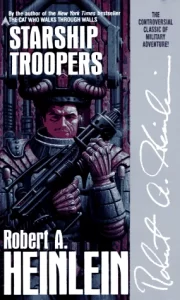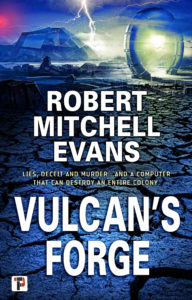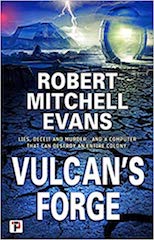\
One of the most divisive science-fiction novels published is Robert A. Heinlein’s Starship Troopers. Written as one his juvenile novels it was rejected out of hand by the publisher and immediately upon publication by another house stirred intense political debate that carries on to the present day. My meager thoughts in no way will settle this argument and for those firmly fixed in their camps nothing will dislodge them.
Troopers posits a future where humanity has spread out to the stars following some war with itself that left in its wake a unified government ending unrest and ushering in a period of

G.P. Putnam’s & Sons
prosperity. The political system of this unified government is a democracy, but one where the right to vote and run for office, the civil franchise, is restricted solely to those who have served in the armed forces.
This ‘only veterans’ franchise is often labeled by the novel’s critics as ‘fascist’ and a system of military rule. While I think the system proposed actually would never work in practice and the author hand-waved his way past serious political and practical issues, both critiques miss the mark.
Fascism has no simple, agreed upon definition. It is often hurled as a charge towards a political system, movement, or person that someone intensely disagree with. The left hurls it at the right and right throws it back. Setting aside the definition of childish tantrums, to me Fascism is a species of the political right, obsessed with a distorted and false view of history, former ‘glory,’ centralized authoritarian government, and most importantly of all the philosophy that the individual’s only value is what the state can extract from them.
The novel gives very little to no description of the culture surrounding its political system. What little history that is presented is fed to the reader as exposition to explain the political system and how it arose with nothing that glorifies some idealized historical vision.
Equally unexplored is the actual details political system. We know that military service is required for the franchise and that active-duty personnel do not have the vote but how centralized is thew power is a question that is never addressed. The closest the reader comes to understanding the culture and the government is the barbaric punishment of flogging is a common judicially ordered punishment. This predilection for cruelty as punishment is the most fascistic aspect of the novel’s setting.
Many critics point to required military service as a fascistic aspect, but I think it doesn’t meet that criterion. Fascist regimes such a Fascist Italy or NAZI Germany treat the people as something that had an obligation to the state. An obligation that could not be refused. Their service to the state was something required not chosen. The system in Starship Trooper is an inverse of that philosophy. Service is given, always at the choice of the person, and in fact the novel gives the impression that people are dissuaded from choosing to serve as more than one character attempts to talk to the protagonist out of volunteering. This plays into the novel’s philosophy of graded level of morality and I’ll speak to that and its error later in the piece. The core central issue here is that in a fascist setting the power is with the state, a state that compels service and here the power is with the individual choosing to serve.
One of the novel’s many exposition heavy scenes also display the frantic handwaving to make this political system work. An instructor asks the class why does the system work and after the students offer possible answers based on the limitation on the franchise, better people, chosen people, and so on, the teacher simply answer it works because it does. Utterly circular logic. It works because the author wants it to work.
Elsewhere in the work it is put forward that there are levels of morality with morality defined as the willingness to put oneself in danger for a goal or purpose. The lowest and most base level is self-interest. ‘I look out for number one and no one else.’ The system then progresses through family, friends, and loved one with the ‘highest’ level of morality being expressed when someone serves and risks all for their community.
Heroic self-sacrifice is a common trope in adventure fiction and something that is nearly universally admired. We need to look no further in the genre than Spock’s solution to Kobayashi Maru test in The Wrath of Khan to see this presented as noble. That said it, in my opinion, is a lousy system to base your politics upon.
The logic in Starship Troopers is that those who volunteer to place their lives on the line by serving in the military are exhibiting a ‘higher’ level or morality and thus are ‘worthy’ of the franchise and political power. This is flawed for several of reasons.
First, while the novel goes out of its way to make clear that no one can ever be denied the chance to serve it is also clear that military discipline is in effect and people are ‘mustered out’ of the service and thus forever lose the chance to exercise the franchise. That means on a practical level the military while forced to accept every as a recruit can still eliminate anyone it does not want to have the franchise. It is far too easy for a military to expel members to use service as a qualification for the franchise.
Second, it presumes the motive for joining the military is a desire to serve. This ignores the possibility of enlisted to learn a trade, experience adventure, escape an unpleasant home, or even to live the thrill of combat and killing.
Another reason this is a terrible idea is that it sees the only meaningful way to serve your community is by way of the military. Teaching, local services, research, and healthcare, the last having its own unique dangers all too well know with the current COVID pandemic, are all ways to place your own needs second to your fellow citizens’.
While I cannot agree with those who hurl ‘fascist’ at the novel’s philosophy, nor can I endorse it. Between handwaving and some very broad and simplistic assumptions it simply ignores the world as the way I have experienced it working.
 construction of the aliens. Mechagodzilla is more powerful than Godzilla that is until the correct interventions by priests, princesses, and the scientists. As with all the 70’s Godzilla movies the film’s resolution is never in any doubt and one does not watch kaiju movies from this period for suspense and dramatic turns, but instead for several men in outrageous costumes throwing down on a set filled with miniature mountains and buildings. Shōwa era Godzilla films, save the original masterpiece, are a fun guilty pleasure. I remember being quite disappointed when Godzilla vs The Smog Monster player at the local drive-in and no one in my family had the slightest interest in going. (I did eventually, only a few years ago, see the film and it is truly one of the weirdest Godzilla movies.) Godzilla vs Mechagodzilla will never listed as a great work of cinema nor is it every frightening, but it makes for a perfect light distraction during the more intense fare of the season.
construction of the aliens. Mechagodzilla is more powerful than Godzilla that is until the correct interventions by priests, princesses, and the scientists. As with all the 70’s Godzilla movies the film’s resolution is never in any doubt and one does not watch kaiju movies from this period for suspense and dramatic turns, but instead for several men in outrageous costumes throwing down on a set filled with miniature mountains and buildings. Shōwa era Godzilla films, save the original masterpiece, are a fun guilty pleasure. I remember being quite disappointed when Godzilla vs The Smog Monster player at the local drive-in and no one in my family had the slightest interest in going. (I did eventually, only a few years ago, see the film and it is truly one of the weirdest Godzilla movies.) Godzilla vs Mechagodzilla will never listed as a great work of cinema nor is it every frightening, but it makes for a perfect light distraction during the more intense fare of the season.




